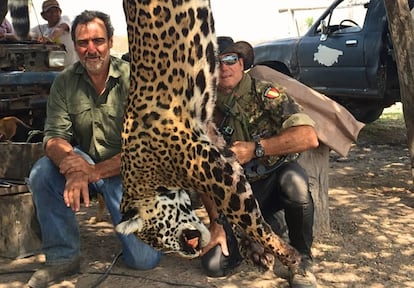Bolivia and Argentina probe illegal hunting network that killed jaguars
For years, the Argentine company Caza & Safaris offered packages of up to $50,000 to wealthy Americans and Spaniards who flew into Bolivian territory to hunt the endangered species

Photographs of smiling hunters posing with jaguar carcasses hanging upside down have gone viral in Bolivia. The individuals pictured are partners and clients of the company Caza & Safaris, a network based in the municipality of Dolores, in Buenos Aires (Argentina) that offered North Americans and Europeans hunting packages costing nearly $50,000 to illegally hunt wild animals in Argentina, Brazil, and Bolivia. The Argentine Federal Police carried out an operation in August 2024 in which they seized more than 3,000 hunting trophies and in which seven people were charged. Meanwhile, in Bolivia, the Prosecutor’s Office last week opened an investigation against Jorge Néstor Noya, an Argentine citizen and alleged head of the organization, and into his Spanish client Luis Villalba Ruiz, who allegedly killed five jaguars in Bolivian territory in September 2023.
Noya, who is under house arrest in Argentina, and Villalba are accused of the crimes of biocide and destruction or deterioration of state property and national wealth, for which they could face up to 19 years in prison. “We know that Mr. Villalba acquired the package to hunt in the protected area of San Matías. His whereabouts are unknown and we want answers from Immigration and Bolivian Air Navigation and Airports (Naabol) to find out his flight plan,” said Alberto Zeballos, department prosecutor of Santa Cruz, the Bolivian city that has jurisdiction over this natural park. The complaint was filed by the lawmaker María Rene Álvarez, the activist group Llanto del Jaguar, and the park ranger Marcos Uzquiano.
Noya attracted foreign clients during his annual trips to conventions organized by an American association called Safari Club International (SCI) and to Expo Cinegética, an annual hunting convention in Spain, according to an investigation by the magazine Nómadas, which had access to the investigation in Argentina. It is presumed that at this last fair he met Villalba, who in an interview posted on YouTube defines himself as “one of the few bow-and-arrow hunters left in the world.” From Spain he arrived in Argentina where, flying in a small plane, he allegedly entered the Bolivian jungle to kill five jaguars, an endangered species included on the Red List of the International Union for Conservation of Nature (IUCN).
“In the photographs [of the hunters with the bodies of the jaguars] we identified other Spaniards who are part of these safaris,” says the director of the magazine Nómadas, Roberto Navia. One of them is Eduardo Romero Nieto, a doctor and owner of the Museum of Wild Fauna in León, who has declared to this newspaper that he “was in Argentina with him [Jorge Néstor Noya] hunting during the rut (mating season of deer and other mammals).” But, he added, “I have never done illegal hunting in my life.” Nieto also claimed that he had no idea that Noya, the man behind Caza & Safaris, was under house arrest.
Another one of the Spaniards who shows up in the photographs is the dentist Diego Romero Ferragut, whom this newspaper has tried to contact without success. At the dental clinic where he works, after being informed of the reason for the call, they hung up without giving any statements.
The network led by Noya has been operating since 1979. Since then, there have been 30 confirmed trips to the Bolivian jungle. The remains of the animals were taxidermied in illegal workshops in Argentina and then sent as “trophies” to the countries of residence of the various hunting clients. Although the investigation on the Bolivian side is still ongoing, the dismissal in January of the director of the National Service of Protected Areas (Sernap) suggests that public officials were aware of the case and may even have been part of the organization. According to the raid carried out by the Argentine police — in which 37 vehicles, a property on the Atlantic coast and three hunting grounds were seized — in addition to jaguars, the illegal hunters killed deer, wild boar and buffalo.
Sign up for our weekly newsletter to get more English-language news coverage from EL PAÍS USA Edition
Tu suscripción se está usando en otro dispositivo
¿Quieres añadir otro usuario a tu suscripción?
Si continúas leyendo en este dispositivo, no se podrá leer en el otro.
FlechaTu suscripción se está usando en otro dispositivo y solo puedes acceder a EL PAÍS desde un dispositivo a la vez.
Si quieres compartir tu cuenta, cambia tu suscripción a la modalidad Premium, así podrás añadir otro usuario. Cada uno accederá con su propia cuenta de email, lo que os permitirá personalizar vuestra experiencia en EL PAÍS.
¿Tienes una suscripción de empresa? Accede aquí para contratar más cuentas.
En el caso de no saber quién está usando tu cuenta, te recomendamos cambiar tu contraseña aquí.
Si decides continuar compartiendo tu cuenta, este mensaje se mostrará en tu dispositivo y en el de la otra persona que está usando tu cuenta de forma indefinida, afectando a tu experiencia de lectura. Puedes consultar aquí los términos y condiciones de la suscripción digital.








































